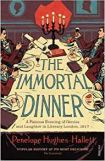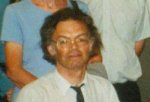The Immortal Dinner: A famous evening of genius and laughter in literary London, 1817 by Penelope Hughes-Hallett
| The Immortal Dinner: A famous evening of genius and laughter in literary London, 1817 by Penelope Hughes-Hallett | |
|
| |
| Category: History | |
| Reviewer: John Van der Kiste | |
| Summary: A vivid account of the dinner thrown by painter Benjamin Robert Haydon in December 1817 at his London lodgings, for guests including Wordsworth, Keats and Lamb - an interesting cultural gathering at a time of great social upheaval. | |
| Buy? Yes | Borrow? Yes |
| Pages: 336 | Date: May 2012 |
| Publisher: Vintage | |
| ISBN: 9780099563723 | |
|
| |
A book based around just one dinner sounds a little extraordinary. But the host, painter Benjamin Robert Haydon, was no ordinary artist. He was a friend of many of the major artistic and literary figures of the day, in addition to being an ambitious painter of historical scenes. Sadly, his ambition was not matched by popularity or good fortune, and despite or perhaps parly because an exaggerated belief in his own abilities, one and a half centuries after his death he is largely forgotten except for his suicide after years of despair, and perhaps his diary as well.
His tragic death, however, was in the dim and distant future when he moved into new lodgings, including a magnificent new painting studio, at Lisson Grove in the Paddington district of central London. To celebrate, and to show off 'Christ's Entry into Jerusalem', the vast new painting which he was working on and of which he was so proud, he threw a dinner on the evening of 28 December 1817. Among his guests were the poets William Wordsworth and John Keats, the essayist Charles Lamb, the explorer Joseph Ritchie, and the fellow painter John Landseer, son of Edwin whose fame as an artist would considerably eclipse his. The occasion was also part of Haydon's way of boosting his own ego and persuading himself, as well as others, that he was one of the greatest figures of the age.
The only existing record for what happened at the dinner is Haydon's own account in his diary. A slightly drunken host with such self-confidence is not the most reliable chronicler of such a happening, so we have to accept his version of events when he tells us that they had 'a glorious set-to' as they discussed Homer, Virgil, Shakespeare and Milton, and that Lamb 'who got exceedingly merry and exquisitely witty' made great fun of the more sober and serious Wordsworth with his 'solemn intonations of oratory'. The latter was not without wit himself, as he told Haydon that he ought to call himself Teniers, after the Dutch artist of the same name, because the picture took him ten years to finish. Keats, meanwhile, had recited several passages from Endymion, bringing to the dinner table a rich fancy of satyrs and fauns and doves and white clouds. Other topics of conversation included the presence of Sir Isaac Newton and Voltaire, alongside Keats and Wordsworth, in the painting which hung on the wall above them.
Being a medium-sized book, the author naturally has to expand her brief on the concerns of the main characters before and after the evening. She touches in some detail on Haydon's other interests and preoccupations, such as the character of scientist Sir Humphry Davy, contemporary theatre and some of its leading lights, and the issue of the Elgin marbles which was quite controversial at the time. Was their removal to the British Museum good safe-keeping and preservation, or daylight robbery? Haydon was one of Lord Elgin's greatest defenders, while Lord Byron, who was not at the dinner, had denounced him as 'a despoiler and a plunderer'.
There is also a wealth of biographical material on the guests, not least the sad life of Lamb, who took it upon himself to become his sister Mary's lifelong carer after she stabbed her mother to death in a fit of insanity, as well as on their interests and views on contemporary culture, and their attitudes to the painting of Turner, whose fame would not only eclipse that of Haydon but make him the most renowned artist of the era. In particular a chapter is devoted to Ritchie, and his unsuccessful African expedition two years later in search of the source of the Niger, a journey which ended like that of so many other explorers in his death.
In addition, we learn about the likely routes each guest would have taken across London to Lisson Grove on that winter's evening, as well as the clothes they probably wore and the food with which they were served. The end result is in part a wonderfully detailed document of contemporary social life.
It is also in a sense a snapshot of England at a crucial time. Two years had elapsed since the defeat of Napoleon at the battle of Waterloo, and less than two years later civil unrest culminated in the Peterloo massacre. Fears of revolution, inspired by events in France less than thirty years earlier, were less acute than formerly but still very real in the minds of some. This is an unusual book and an unusual subject, and as such makes a very rewarding historical read.
If this appeals then we're sure that you might enjoy Words and Pictures: Writers, Artists and a Peculiarly British Tradition by Jenny Uglow.
Please share on: ![]() Facebook,
Facebook, ![]() Twitter and
Twitter and
![]() Instagram
Instagram
![]() You can read more book reviews or buy The Immortal Dinner: A famous evening of genius and laughter in literary London, 1817 by Penelope Hughes-Hallett at Amazon.co.uk Amazon currently charges £2.99 for standard delivery for orders under £20, over which delivery is free.
You can read more book reviews or buy The Immortal Dinner: A famous evening of genius and laughter in literary London, 1817 by Penelope Hughes-Hallett at Amazon.co.uk Amazon currently charges £2.99 for standard delivery for orders under £20, over which delivery is free.
![]() You can read more book reviews or buy The Immortal Dinner: A famous evening of genius and laughter in literary London, 1817 by Penelope Hughes-Hallett at Amazon.com.
You can read more book reviews or buy The Immortal Dinner: A famous evening of genius and laughter in literary London, 1817 by Penelope Hughes-Hallett at Amazon.com.
Comments
Like to comment on this review?
Just send us an email and we'll put the best up on the site.


